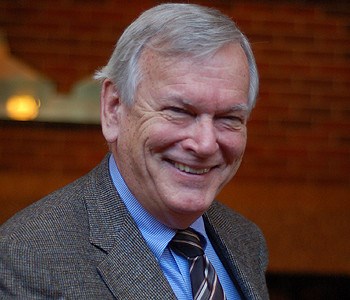Talk of a chromite refinery on the north shore could be premature says a mining company president.
KWG Resources Inc. president Frank Smeenk arrived in Thunder Bay to speak at the Chamber of Commerce Annual General Meeting Wednesday. After shipping chromite from a proposed railway to Nakina, Smeenk said the shipments would most likely be processed in places like Prince Rupert, B.C. to the West or Montreal in the East to reach demanding markets such as China and Europe.
Shipping South to Lake Superior is still a possibility, but Smeenk said it’s not as likely as originally anticipated.
"That’s maybe not as important as we originally thought," Smeenk said.
Smeenk said The Ontario Mining Act states that further processing of a mineral mined in Ontario must be done in Canada, so chromite would have to be processed somewhere in the country. Along with the cost of ore and coke to process chromite, Smeenk said energy is a huge cost for refineries, something Ontario doesn’t provide cheap compared to other provinces.
"We’re not famous around here for our cheap electricity," Smeenk said.
Smink cautioned that since mining chromite in the ring of fire hasn’t begun, the decision on where to put a refinery is still months or even years away.
As a blockade from six First Nations communities is still underway at the ring of fire, Smeenk said he thinks revenue sharing discussions and employment opportunities for people living in the region are productive.
He said most people in his industry agree with revenue sharing. Smeenk said because mining can be so profitable, KWG and other companies can fit First Nations people into their business structure.
"The most important thing for us (KWG) is to find the things that we can do right away that can employ the people that are up there right now," Smeenk said. " They need jobs today not next year."
And the KWG president believes mining could still change the Northwest for the better.
"It is like finding a new oil field," he said. "North America has never had a domestic source of supply of chromite. The grade is so high and the deposit is so large that mining could go on for decades."
KWG made the discovery in a joint effort with Spider Resources Inc. The company looked for diamonds in the Northwest Territories and used the opportunity to look for other minerals. The discovery was a high-grade mineral that can be used to make stainless steel – chromite.
Smeenk said chromite is an essential ingredient when making stainless steel and there could be a huge market from Japan, China and Korea. This will give North America its own source of chrome for the steel-making industry instead of importing material.
"You can’t make stainless steel without chrome. Fifteen to 18 per cent of all stainless steel is chrome," he said.
Smeenk said he is looking for office space in Thunder Bay to set up shop. He plans to move more of his company into Thunder Bay and hire local workers. However, the company could start development within five to 10 years, he said.
"Thunder Bay is the service centre. Everything passes through here and transportation and communication is great. This is the place that will feed the mines and be fed by the mines," he said.
The cost to start up production is more than a billion dollars. Smeenk said a smelting factory and an open pit to mine would cost US$800 million. He added a new railway is an option to move the material. Despite the costs, Smeenk said the pay back is fast.
Harold Wilson, president of the Thunder Bay Chamber of Commerce, said the ring of fire developments have been under the radar and local businesses want to know what the plan is.
"(The general meeting) is an opportunity to give it a real focus," Wilson said. "This is an opportunity for new dollars to be coming into our area. Billions of new dollars that will be dispersed all over northern Ontario."
Thunder Bay hasn’t fully embraced mining as an economic sector, Wilson said.
He said high expectations are dangerous but the resources are real and contractors are already working to sell the goods.
"It is the war of expectations," he said. "You need to stoke the fire but you don’t want to get burned."
Wilson said the more businesses satisfy the needs of the contractors, the more the city will benefit economically.
But as in any business, there are no guarantees. Companies need to step up if they want to get a piece of the action, he said.
Sign in or register
- Messages
- Post a Listing
- Your Listings
- Your Profile
- Your Subscriptions
- Your Likes
- Your Business
- Support Local News
- Payment History
Registered Users
Already have an account?
New Users
Create a free account.
